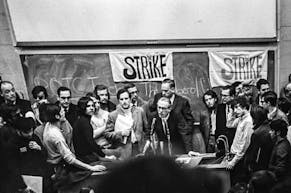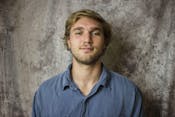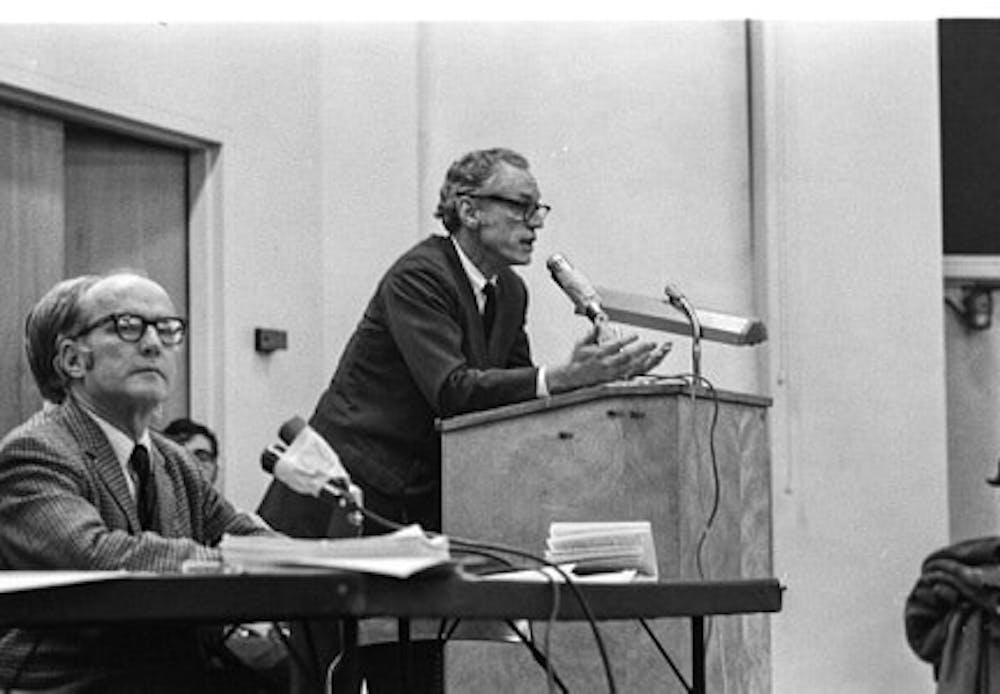Peter Regan, former acting UB president, executive vice president and professor, died at 95 on April 5.

Fifty years ago, Regan took over as acting president for one year from 1969-70, while President Martin Meyerson took a leave-of-absence, and later left UB. Regan’s term was marked by campus protests and a large police presence, which climaxed when 45 faculty members –– known as “the Faculty 45” –– were arrested in Hayes Hall after demanding to meet with Regan to discuss the police presence on campus, according to former UB archivist Marchand Finnegan.
But Regan’s mark on UB, his colleagues and his family, included more than protests.
“To me he was a ‘big picture’ person who has the unique qualification of being an education policy maker, architect of the education system and superb administrator of educational institutions,” said Regan’s former colleague Seung-Kyoon Park, a psychiatry professor.
Regan joined UB as a psychiatry professor and vice president for health sciences in 1964. He served as executive vice president from 1966-70. After his year as acting president, Regan returned to the psychiatry department to continue his research and teaching until 1984, when he left to join the University of Texas Health Science Center in San Antonio.
“Each stop in his career provided new experiences that built on those which preceded,” Regan’s son, William said. William retired from a 39-year career as UB’s events manager last year.
But the “most important and consequential moment” in Regan’s life was when he met his wife, Laurette O’Connor, at just seven years old, according to William. They were childhood neighbors who married in 1949. William said Regan and O’Connor shared an 85-year “journey” together before O’Connor died in 2017.
After growing up in New York City, Regan went to Fordham, Idaho and Stanford universities for his undergraduate education. He was enlisted in the Army from 1943-46, before earning his medical degree from Cornell University Medical College in 1949, and served as an officer in the Army Medical Corps from 1951-52.
Regan was an assistant professor of psychiatry at Cornell until 1958, when he became professor of psychiatry and founding chair of the Department of Psychiatry at the University of Florida College of Medicine.
Regan joined UB as a psychiatry professor and vice president for health sciences in 1964, where he instituted the School of Health Related Professions at UB in 1965, which is now the School of Public Health and Health Professions, before serving as executive vice president.
From ‘72-’74 Regan was on leave from UB, conducting an international study on education of the health professions for the Paris-based Organization for Economic Cooperation and Development.
While Regan worked as a professor at UB in 1979, he also served as associate chief of staff for education at the Buffalo VA Medical Center.
Regan’s term as acting president was during a time of cultural and academic transformation at UB, according to Finnegan. Many young faculty were hired after UB was incorporated into the SUNY system, and student activism related to the Vietnam War was widespread on campus and at universities across the nation. UB students led protests about a “racist coach” on the men’s basketball team, the Reserve Officers’ Training Corps’ presence on campus and “classified military research,” according to history professor Michael Frisch, who was one of “the Faculty 45.”

Regan (center) speaking at a public meeting in 1970.
“[Regan] was in a difficult position,” Finnegan said. “I suppose it may be a generational gap. He didn’t understand and he didn’t at all appreciate these activist students.”
Although Regan’s presidency was dominated by campus unrest, he is remembered as having a “distinguished” career as an academic and an administrator.
Park, who joined UB in 1967, said he would “look up to” Regan as a “seasoned professor.” When Regan returned to his role as a psychiatry professor, Park said the department chair “invariably asked Dr. Regan for his help” when needed.
“It seems logical in one hand and ironic in another that [Regan] often was asked to come in to clear up the messed up systems,” Park wrote in an email. “He was a visionary. He thrived when challenged.”
Regan’s survivors include: his four sons William, Peter, Stephen and John; his two daughters Elizabeth Shallowhorn and Carol Regan; his sister Vera Bedard; and his thirteen grandchildren and two great-grandchildren.
“He was the epitome of a lifelong learner, and had a terrific memory,” William said. “He had the capacity to evolve and apply new information in each aspect of his life for which we were all beneficiaries –– his children, as well as friends, colleagues, and especially the
public for whom he spent a lifetime serving.”
Regan’s remembrance service will be arranged at a later date.
Julian Roberts-Grmela is a senior news editor and can be reached at julian.grmela@ubspectrum.com and on Twitter @GrmelaJulian.

Julian Roberts-Grmela is a senior news editor for The Spectrum and an English and philosophy major. His favorite book is “White Teeth” by Zadie Smith and he hopes that one day his writing will be as good as hers.





